Couples and Cars – Top Driving Pet Peeves

We’ve all been there. You’re trapped in the passenger seat on your way to the movies, dinner, or drinks with friends while your partner tailgates the car in front of you, drives too fast, or swerves into the next lane. You try to be cool, but you just can’t seem to release the tension that keeps driving your foot toward the invisible brake on the floor.
When it comes to driving, we’ve all got plenty of complaints about our significant other’s habits. Some people, like in the scenario above, drive too fast or follow too closely. Others don’t listen when we make suggestions. Some play loud music, blast the heat, or get lost (and refuse to ask for directions).
Whatever your partner’s fatal driving flaw, you’re most definitely not alone in being annoyed by it. In fact, we asked more than 2,000 people in relationships to tell us about their top driving pet peeves. What did we learn? Well, let’s just say you’ve probably dealt with some of these frustrations yourself.
Top Driving-Related Pet Peeves That Impact Relationships
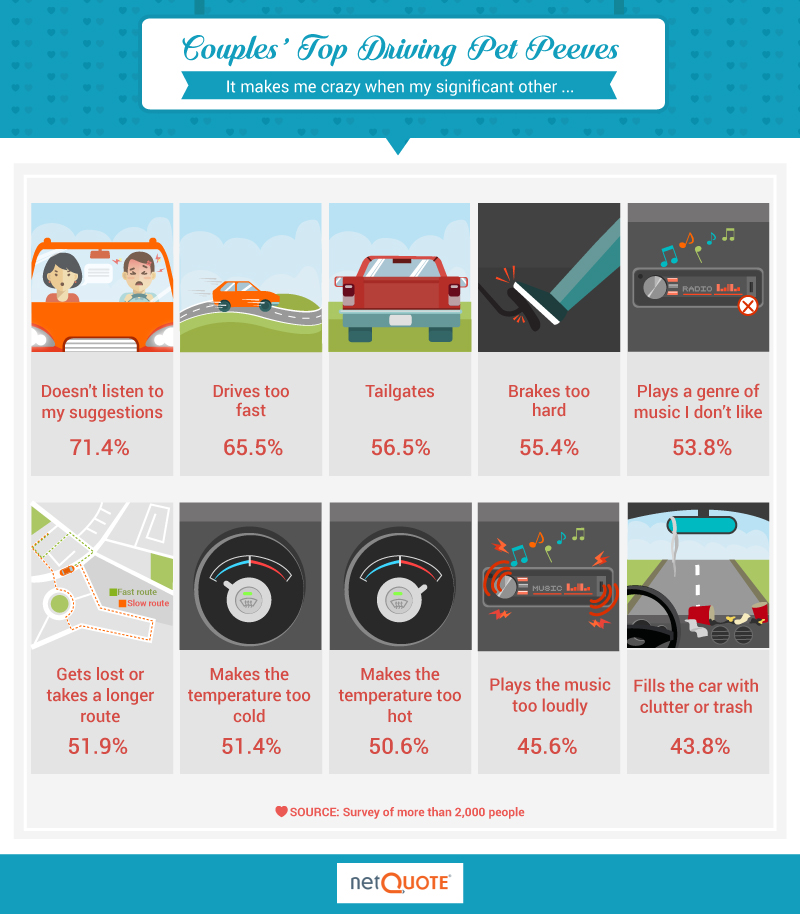
If you’re in a relationship in the United States, chances are good that you spend plenty of time in the car with your partner. According to the U.S. Department of Transportation, the average American between the ages of 20 and 54 drives over 15,000 miles per year. And, of course, plenty of that car time is spent with a partner.
So when we’re stuck in the car for all those miles with our otherwise loveable partners, what are the things that drive us craziest? Our survey says it’s when they won’t listen to our suggestions, when they drive too fast or when they tailgate.
More than 50 percent of those surveyed also hate it when their partners brake too hard, play a radio genre they don’t like, get lost, take a slower route, or turn the temperature too far up or down.
Driving Habits That Drive Us Crazy
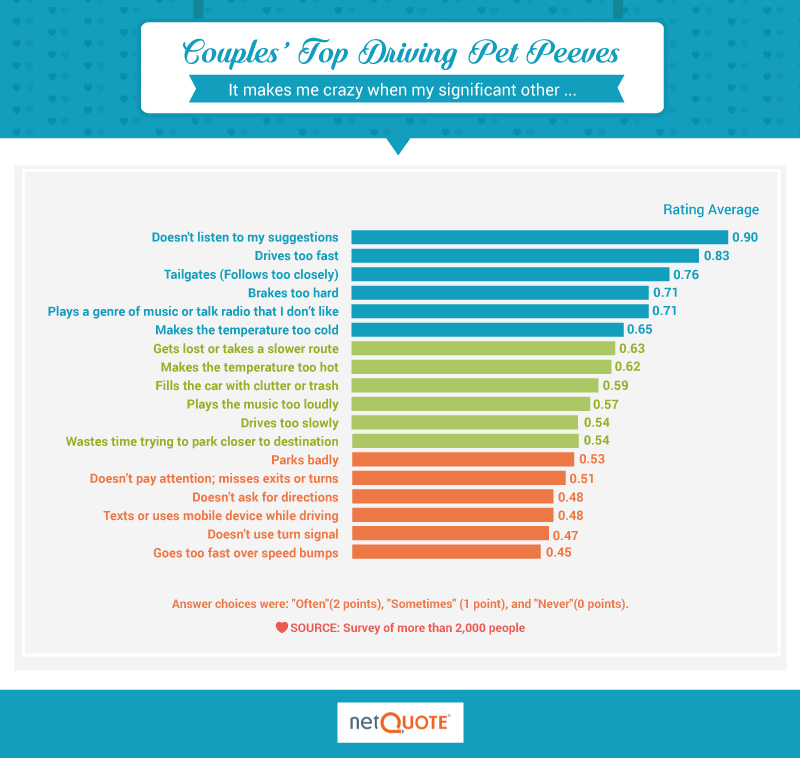
When we asked our survey respondents to fill in the blank: “It makes me crazy when my significant other _____.” These were the responses that came up the most: We hate it when our partners won’t listen to us, drive too fast or tailgate. And we’re not big fans of hard braking, non-mutual music tastes, or chilly car interiors, either.
But what are the rest of our pet peeves? Turns out, driving too slowly, changing the station too often, parking badly and not paying attention on the road make our blood boil just a bit. Cursing, weaving in and out of traffic, waiting until the car is running on fumes to fill the gas tank, or talking on the phone while driving rank as only slightly less annoying.
Survey respondents were less concerned when their partners drove while under the influence of a drug, smoked in the car, or parked illegally (though there’s no way to know if this is because their partners don’t take part in the activity or simply because they don’t care when they do).
Driving Pet Peeves, by Gender
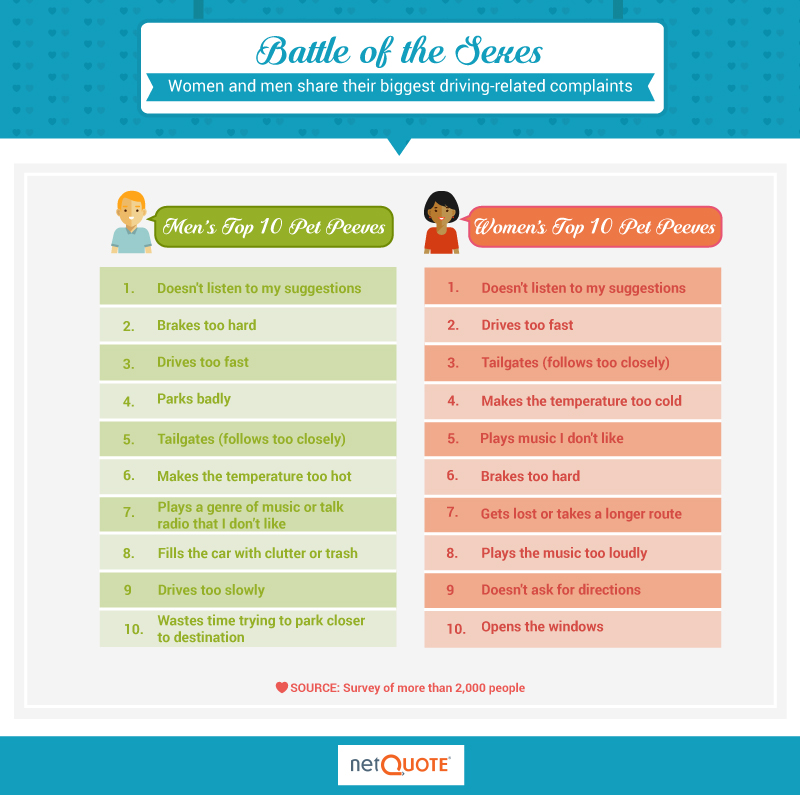
We found some interesting differences when we divided up the responses by gender. Whether this is because women and men are annoyed by different things, or because the sexes offend in different ways, the top 10 pet peeves of women and men vary a bit.
Women are more annoyed with their partners for (in order) driving too fast, tailgating, turning down the heat or playing a radio station that they don’t like. Men, on the other hand, hate it most when their partner brakes too hard, drives too fast, parks badly, or tailgates – in that order.
The one thing both genders agree on? The worst thing someone can do while driving is ignore their partner’s suggestions.
Who’s Driving Whom Crazy?
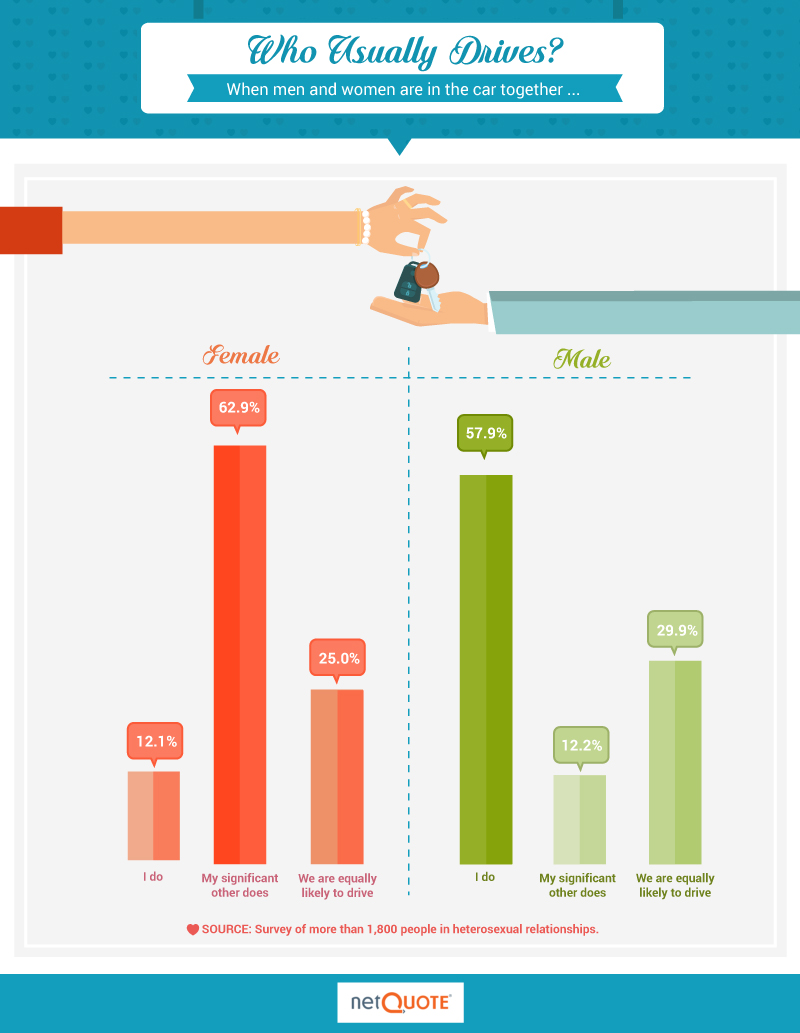
We asked our survey respondents in opposite-sex relationships which partner drives more often, and it turns out that men are much more likely to do the driving (more than 57 percent of male respondents said they do most of the driving). The most common factors determining which partner should drive were related to who was more alert, who enjoys driving more, who is more familiar with the area, and who likes to be in control (in order). Only 23 percent of respondents said they decided based on “who is the better driver.”
Braking … or Breaking Up?
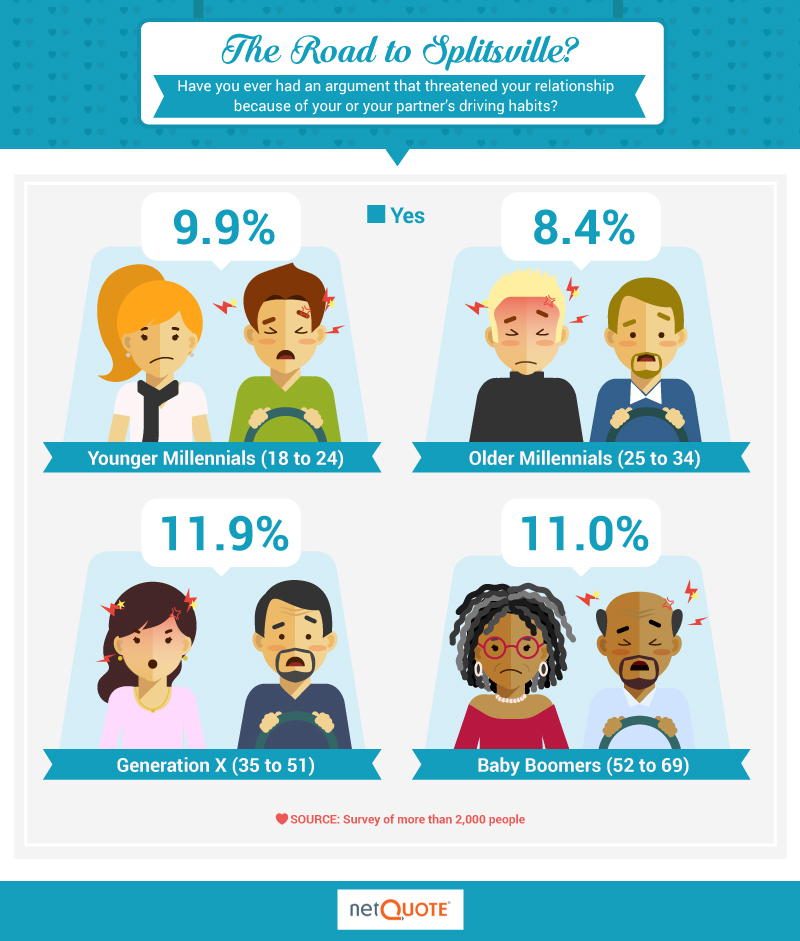
So we’ve all got a few pet peeves, perhaps because of our kamikaze partners and perhaps just because we all like to feel in control, and being in the passenger seat is a bit more vulnerable. But how many of us have actually threatened to leave a partner because of his tailgating or her parking issues? Are driving issues breakup-worthy?
We asked our survey respondents, and it turns out that most of us aren’t willing to break things off over offending car habits. Fewer than 10 percent of Millennials said they’ve had a driving-related argument that threatened the very foundation of their relationship. The risk increases slightly with age, but fewer than 12 percent of Generation Xers and Baby Boomers have had a potentially relationship-ending fight about driving patterns.
Who’s Most Stressed on the Road?
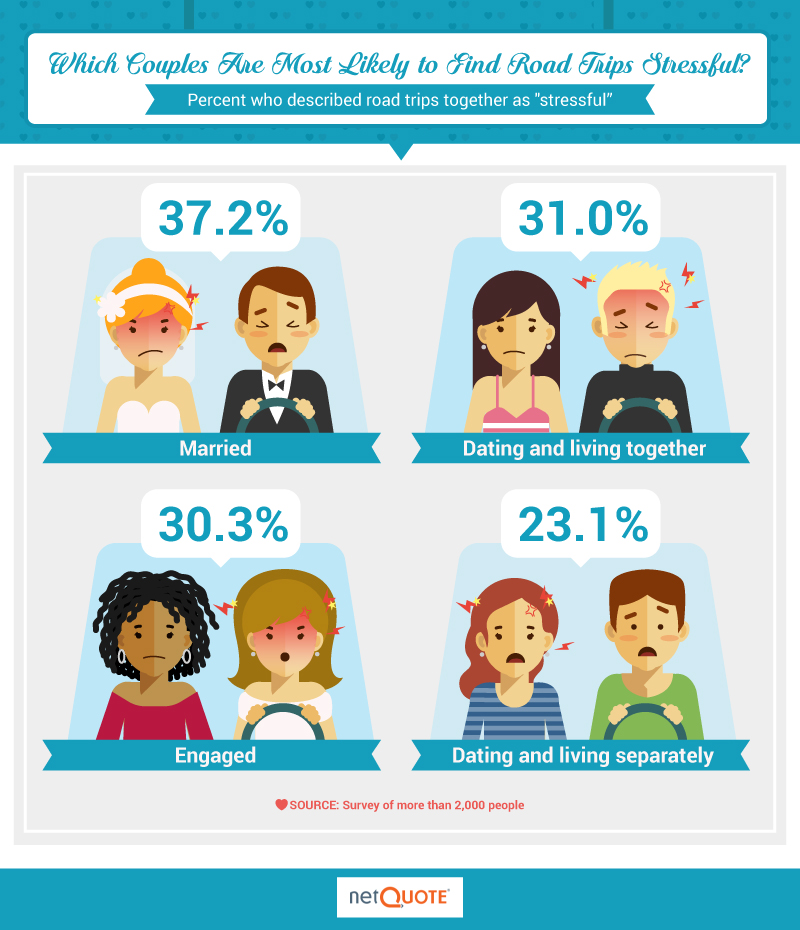
Did you know that married people are more likely to find road trips stressful than unmarried couples? And couples who have separate spaces to return to at the end of the day find road trips the least stressful of all?
We asked our survey respondents to rank their road trip stress levels. The good news is that more than half of us don’t find road trips stressful at all. The bad news? The more outwardly committed (married, living together) you are to your relationship, the more stressful the trip is likely to be.
Beware the Backseat Driver
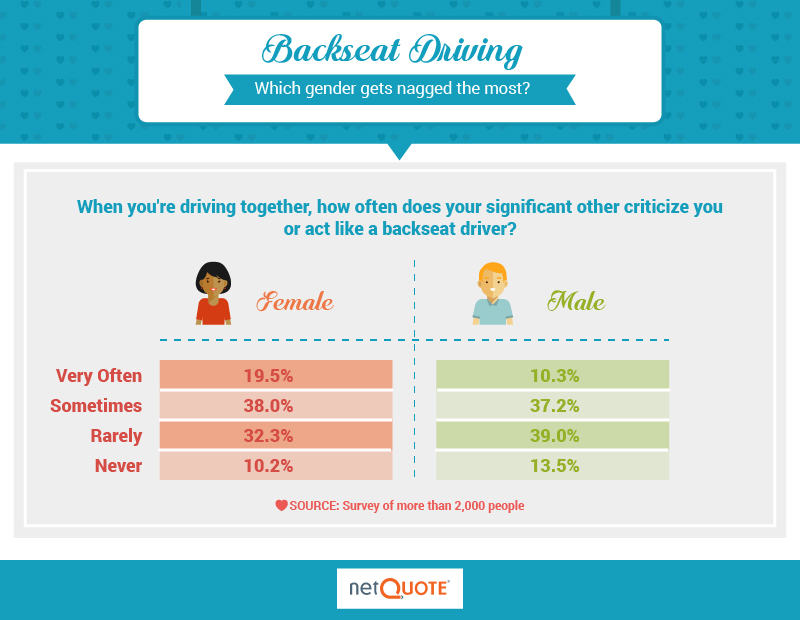
So we know who’s most likely to do the driving, and we know which couples are most annoyed with each other − but what about the person pushing that invisible brake, offering “helpful” suggestions from the backseat, and worrying out loud about the driver’s habits?
According to our survey, female drivers often take the majority of the nagging: 19.5 percent of female respondents said their partner criticizes them “very often” while they drive, and another 38 percent said it happens “sometimes.”
Men are less likely to take criticism − or are less likely to notice or remember − with only 10.3 percent reporting that their significant other criticizes them from the passenger seat “very often.”
The bad news? Backseat driving can be dangerous. According to a 2011 study in the UK, 14 percent of drivers “have had an accident or near miss because of a backseat driver.” So perhaps it’s time for both genders to back off a bit on the helpful suggestions.
Backseat Drivers, by Region
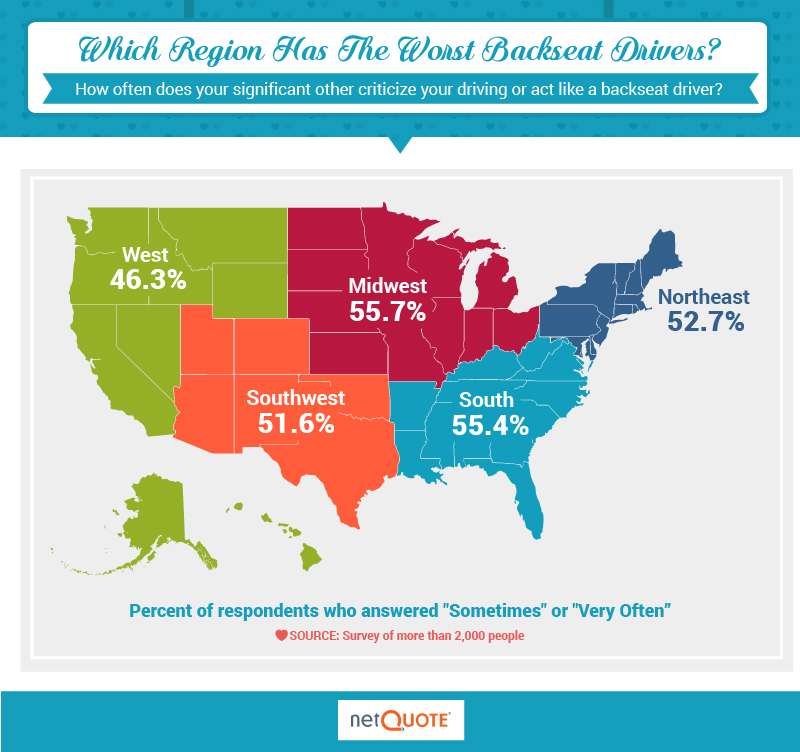
So, are backseat drivers everywhere, or are some regions worse than others?
Interestingly, there isn’t a big regional difference. In every region, between 46 and 56 percent of our survey respondents reported that their significant others “sometimes” or “very often” play the role of backseat driver. The region slightly less likely to have this problem is the West, and the regions somewhat more likely are the Midwest and the South.
Petrified in the Passenger Seat
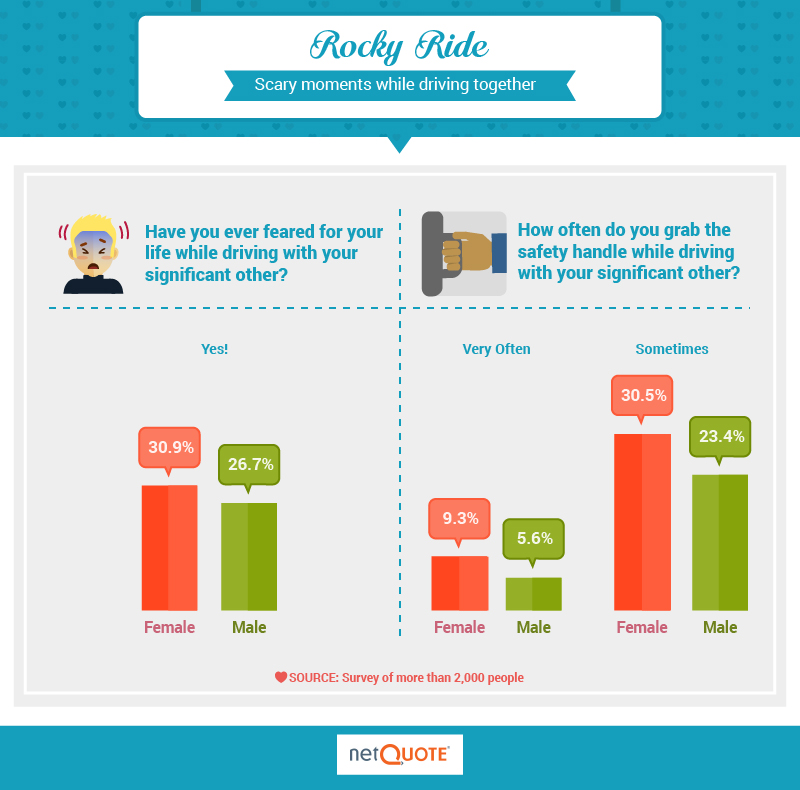
Finally, we asked our survey respondents a more somber question: have you ever feared for your life while driving with your significant other?
The good news is that most of the respondents (more than 50 percent) said no; most people feel safe on the road with their husbands, wives, boyfriends and girlfriends. The bad news? 30.9 percent of women and 26.7 percent of men say yes. Not only have we been annoyed by our partners’ driving habits, but we’ve actually felt endangered by them – a sobering thought for those of us behind the wheel.
Conclusion
There are a thousand reasons to be annoyed on the road: traffic jams, construction, that little red car that just cut you off … and even the driving habits of the person you love most. So what annoys you on the road? How have you been, perhaps, annoying your own partner? And what can we all do to be safer drivers, kinder partners, and more relaxed passengers to increase our safety and the pleasantness of our commute?
Our survey would seem to suggest that observing speed limits, using the three-second rule to avoid tailgating, and compromising on music and temperature are a great place to start.
Methodology
We conducted an online survey of 2,081 people in relationships from Aug. 9 to 10, 2016. Respondents came from all 50 states, plus the District of Columbia. They were 48 percent male and 52 percent female and ranged in age from 18 to 73.
Sources
- https://www.fhwa.dot.gov/ohim/onh00/bar8.htm
- http://www.dailymail.co.uk/news/article-2006332/Back-seat-drivers-cause-seven-accidents-near-misses–chances-youre-guilty-too.html
- http://www.driversedguru.com/driving-articles/drivers-ed-extras/the-3-second-following-distance-rule/
Fair Use
Feel free to share and publish any of these images. We just ask that you credit NetQuote.com and provide a link back to this page so your readers can find out more about our research.
